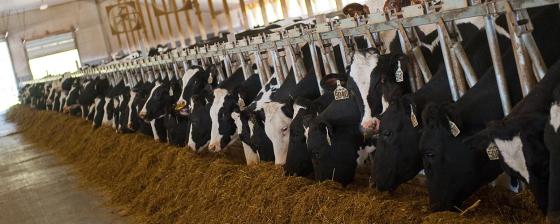Posted August 5, 2021 at 03:34pm by Joanna Cummings
Vermont-Based Project Prepares Farms to Maintain a Secure Food Supply

August 5, 2021
Contact: Joanna Cummings
University of Vermont
Joanna.Cummings@uvm.edu
802-656-2584
New England Project Prepares Farms to Maintain a Secure Food Supply
Burlington, VT – Most grocery stores have a dairy section lined with coolers full of milk, butter, cheese and yogurt. Our favorite dairy foods are always there, day or night, but that might not be the case if the milk supply from farms, to processors, to stores is halted by a livestock disease outbreak that interrupts the supply chain. The same could happen with beef, chicken or pork products.
Fortunately, the United States prepares for livestock disease emergencies with national “Secure Food Supply Plans”. The plans provide guidance for farmers to prepare before a disastrous disease outbreak—such as foot and mouth disease (FMD)—to limit the exposure and infection of their animals. Farms that meet a plan’s criteria for disease prevention, and do not have diseased animals on their premises during an actual outbreak, are in a good position to apply for permits that will allow them to continue moving animals and products.
New England farms, and the systems that process and move their products, have considerations that generic national plans often do not address. University of Vermont Associate Professor Julie Smith, DVM, was recently awarded a grant from the USDA Animal and Plant Health Inspection Service (APHIS) to work with agricultural stakeholders on developing a New England-style secure food supply plan.
Secure Food Supply New England (SFSNE) will bring together veterinarians and producers to develop plans and resources, including a web app for livestock disease prevention. The scope of the project reflects how New England’s economically dominant agricultural sector works. Smith explained, “New England state veterinarians recognized the fact that the dairy industry requires movements across state borders regularly. To assist with the continuity of business and prevent an environmental disaster such as the dumping of milk, the states first came together to develop the Secure Milk Supply Plan for New England in 2015.”
An advisory board working with Smith consists of state animal health officials from Vermont, New Hampshire, Maine, Massachusetts, Connecticut, and Rhode Island; USDA APHIS Veterinary Services personnel; university research scientists; dairy producers and emergency management consultants.
Secure Food Supply New England is Vermont-led and will build on previous planning projects to:
- Continue secure milk supply planning and develop permitting processes that can be applied to other livestock and poultry species.
- Engage with public and private veterinarians and producers.
- Deliver a web application to support readiness at the farm level.
- Conduct a test run of permitting movements (i.e., a tabletop exercise in emergency management terms).
Smith elaborated, “We envision creating a web app where a farmer raising all types of livestock or poultry can develop an enhanced biosecurity plan and be able to share it with emergency responders when needed. We can’t do this without the input of farmers and veterinarians who are essential to the process.”
For more information, visit the Secure Food Supply New England website at www.secure-agriculture.org.
Foot and mouth disease (FMD) is classified in the United States as a foreign animal disease: foreign, because it is not currently present in the US but is present in other countries. FMD mainly affects cloven or split-hoofed animals such as cows, sheep, pigs, goats and deer. Many foreign animal diseases are highly contagious, spread quickly, and can have devastating impacts on animal health, human health, food production and the economy. African swine fever is another foreign animal disease that affects pigs, and it has been quickly decimating swine populations across the globe since 2007.
If a foreign animal disease is found in US livestock or poultry, federal regulatory officials will limit the movement of animals and animal products to control the spread. Farmers who practice daily animal disease prevention and prepare their own Secure Food Supply Plan are less likely to have their business operations interrupted during a foreign animal disease outbreak.
Grant funding for Secure Food Supply New England is through NADPRP, the National Animal Disease Preparedness and Response Program. In 2018, the U.S. Congress established NADPRP to further strengthen efforts to prevent, prepare for and respond to outbreaks of foreign animal diseases like FMD, which could pose great risks to agricultural food systems.
This project is funded by USDA’s Animal and Plant Health Inspection Service (APHIS) through the 2020 National Animal Disease Preparedness and Response Program, under cooperative agreement AP21VSSP0000C008. The contents are solely the responsibility of the authors and do not necessarily represent the official views of the USDA or APHIS.
